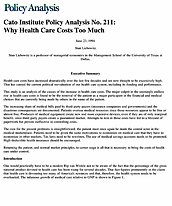This study is an analysis of the causes of the increase in health care costs. The major culprit in the seemingly endless rise in health care costs is found to be the removal of the patient as a major participant in the financial and medical choices that are currently being made by others in the name of the patient.
The increasing share of medical bills paid by third-party payers (insurance companies and governments) and the disastrous consequences are documented. Patients overuse medical resources since those resources appear to be free or almost free. Producers of medical equipment create new and more expensive devices, even if they are of only marginal benefit, since third-party payers create a guaranteed market. Attempts to rein in those costs have led to a blizzard of paperwork but proven ineffective in controlling costs.
The cure for the present problems is straightforward: the patient must once again be made the central actor in the medical marketplace. Patients need to be given the same motivations to economize on medical care that they have to economize in other markets. Tax laws need to be rewritten. The use of medical savings accounts needs to be promoted. High-deductible health insurance should be encouraged.
Returning the patient, and normal market principles, to center stage is all that is necessary to bring the costs of health care under control.


